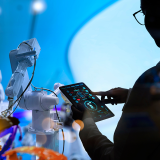
Antecipação e gestão do impacto da mudança
A antecipação e gestão do impacto da mudança é uma das seis atividades principais do programa de trabalho da Eurofound para o período de 2021-2024. A Eurofound fornecerá dados sobre os desenvolvimentos estruturais que afetam a economia e os mercados de trabalho da UE, impulsionados, em grande medida, pela digitalização e pela transição para uma economia neutra em carbono, mas também pela crise da COVID-19. A investigação destina-se a auxiliar os decisores políticos na antecipação e preparação dos mercados de trabalho e dos locais de trabalho europeus para estas mudanças.
A partir de 2021, a Eurofound fornecerá informações sobre o impacto destas megatendências nas condições de vida e de trabalho na UE. No domínio da digitalização, a investigação incidirá no impacto no emprego e nas condições de trabalho, bem como no mercado de trabalho. Os domínios a abranger incluirão o diálogo social e o seu papel na definição das mudanças estruturais, dos quadros regulamentares, da proteção social e da inteligência artificial (IA). Com base em estudos anteriores relativamente ao trabalho em plataformas em linha, o período de 2021-2024 constituirá uma oportunidade para se centrar no mapeamento e na avaliação da eficácia das iniciativas políticas na resposta aos desafios identificados com o trabalho em plataformas em linha.
A Eurofound procurará também apoiar a transição da UE para uma economia neutra em carbono, incluindo a economia circular e a execução do Instrumento de Recuperação da União Europeia, Next Generation EU, investigando os efeitos socioeconómicos. Estes incluem as mudanças no emprego e a transformação dos empregos e das condições de trabalho, bem como o impacto distributivo das políticas para as alterações climáticas. Alguns destes trabalhos basear-se-ão nos resultados de um projeto-piloto sobre o futuro da indústria transformadora (FOME) realizado pela Eurofound.
Para dar continuidade a este trabalho em 2021-2024, a Eurofound cooperará com várias organizações internacionais e agências da UE, por exemplo com a Agência Europeia do Ambiente (AEA) no domínio dos impactos sociais das políticas para as alterações climáticas. Além disso, será consolidada a colaboração existente com outros intervenientes na investigação nos domínios da digitalização — o Centro Comum de Investigação (CCI), a Agência dos Direitos Fundamentais da União Europeia (FRA) e a Agência Europeia para a Segurança e Saúde no Trabalho (EU-OSHA). Está também prevista uma parceria mais ampla com a Organização Internacional do Trabalho (OIT) sobre o mundo do trabalho em transformação.
- Infografia: Antecipação e gestão do impacto da mudança na UE
«A economia e os mercados de trabalho da UE caracterizam-se pelo impacto das megatendências, nomeadamente a digitalização e a transição para uma economia neutra em carbono. É importante analisar de que forma estas transições estão a funcionar exatamente, o que está a mudar e a forma como isto terá impacto não só nas empresas, mas também na mão-de-obra e na sociedade.»
Irene Mandl, Chefe da Unidade de Emprego



































